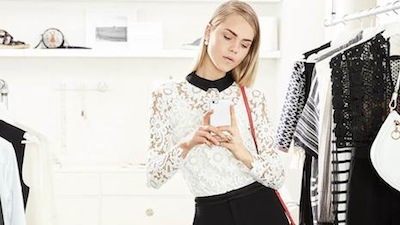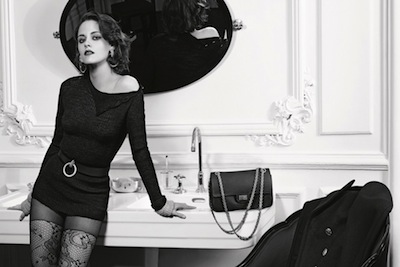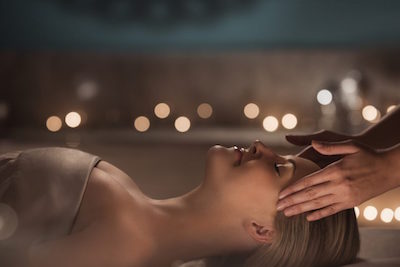 Image courtesy of Printemps
Image courtesy of Printemps
According to lifestyle magazine Robb Report, luxury spending is on the rise with 55 percent of affluent consumers having more of an interest in the industry than they did a few years ago.
Robb Report’s “New Luxury” report found that of the 55 percent of survey respondents, 62 percent of millennials and 64 percent of the wealthy are interested in goods and services offered by the luxury industry. The resurgence of luxury interests will also propel spending, with 23 percent respondents planning to increase spending over the next two years.
“As the leading voice of luxury for over 40 years, Robb Report Media is on the pulse of what matters most to today’s luxury consumer,” said Paige McCrensky, senior vice president of marketing at Robb Report. “In our May New Luxury issue, our editorial team examined the individuals and companies whose bold values, groundbreaking technologies and innovative ideas are reshaping the existing definition of luxury.
“Robb Report also wanted to speak directly to luxury consumers to get their perspectives on what luxury means to them today, how they are engaging with media across multiple platforms and where they see the future of luxury,” she said. “To analyze the hot-button topic of ‘new luxury,’ Robb Report hosted a half-day symposium that unveiled new proprietary research Robb Report fielded with global market research company Ipsos, and feature a series of thought-provoking presentations and panel discussions with luxury industry leaders who helm the innovative brands that are leading the charge.
“The New Luxury Report research not only informs and empowers the Robb Report brand internally, but also allows us to share these insights with our advertising partners – providing them with additional information to create smarter marketing tools in engaging this lucrative audience. Only Robb Report could curate such a diversity of luxury brands to share and reveal their perspectives on consumer behavior and their best practices.”
Together with Ipsos, Robb Report surveyed more than 1,000 affluent adults residing in the United States, ages 18-64 and with a household income of more than $100,000 between April 1-18. The online survey looked across demographics, wealth and gender with queries on the state of luxury, interests, brands, influencers and spending intentions.
Robb Report presented its research at a symposium in New York on May 17.
Shifting habits and interests
Robb Report’s survey found that the millennial lifestyle and how the demographic consumes media has created trends within the luxury industry. Millennial behavior is also rubbing off on established, wealthy consumers who have begun leveraging these habits as they seek out luxury experiences and goods.
Although luxury is evolving and consumer behavior is shifting, the traditional values associated with the sector remain strong. Survey respondents are still attracted to brands with strong ties to quality, craftsmanship and reputation.
Quality ranked the highest at 76 percent, while craftsmanship followed closely behind at 75 percent. A brand’s heritage was considered to be most important by 67 percent of survey respondents.
Above all, respondents emphasized a focus on personal service. Seventy percent preferred craftsmanship over new technology, at only 30 percent. Understandably, millennials rated new technology higher than their older peers, but only at a rate of 38 percent.
 Image courtesy of Neiman Marcus
The importance of classic and cutting-edge brands was 57 percent and 43 percent, respectively, with new brands being preferred by 51 percent of millennials. With heritage brands often relying on their status, it is becoming increasingly important for these brands to offer new products to remain relevant in a changing market.
Classic brands that maintain top-of-mind resonance with respondents are most often automotive, heritage apparel, jewelry and watch brands. For other categories, including travel, technology and retail, consumer preference is more broad.
New habits have also paved the way for new sensibilities and interests. Accessibility, for instance, is preferred by 71 percent of consumers while only 29 percent claimed exclusivity.
“Accessibility is a key part of the new luxury, which seems a bit of a paradox with how luxury brands have traditionally been perceived,” Ms. McCrensky said. “It’s the age we live in now.
Image courtesy of Neiman Marcus
The importance of classic and cutting-edge brands was 57 percent and 43 percent, respectively, with new brands being preferred by 51 percent of millennials. With heritage brands often relying on their status, it is becoming increasingly important for these brands to offer new products to remain relevant in a changing market.
Classic brands that maintain top-of-mind resonance with respondents are most often automotive, heritage apparel, jewelry and watch brands. For other categories, including travel, technology and retail, consumer preference is more broad.
New habits have also paved the way for new sensibilities and interests. Accessibility, for instance, is preferred by 71 percent of consumers while only 29 percent claimed exclusivity.
“Accessibility is a key part of the new luxury, which seems a bit of a paradox with how luxury brands have traditionally been perceived,” Ms. McCrensky said. “It’s the age we live in now.
 Chanel pre-fall 2016 campaign
“Consumers are having a dialogue with brands and the conversation goes both ways,” she said. “Consumers can access luxury brands as easily as luxury brands can access consumers, and they are looking for brands to be more accessible.”
But, exclusivity maintains its appeal for the wealthy, with 48 percent agreeing, but brands must uphold an accessible dialogue with consumers who wish to interact on their own terms.
Consumers have also shown a strong interest in brands that are open about sustainability practices. Millennials have especially shown an interest in brand ethics with 73 percent preferring transparency due to the demographic's philanthropic focus.
In addition to a rise in sustainability, 81 percent of consumers are drawn to health and wellness. The travel industry has benefited the most from this as 54 percent of consumers show an interest in health and wellness, 66 percent of whom are classified as wealthy.
Overall, 65 percent of consumers preferred experiences whereas 35 percent opt of material goods. Similarly, 62 percent favor exploration over pampering during a vacation.
Chanel pre-fall 2016 campaign
“Consumers are having a dialogue with brands and the conversation goes both ways,” she said. “Consumers can access luxury brands as easily as luxury brands can access consumers, and they are looking for brands to be more accessible.”
But, exclusivity maintains its appeal for the wealthy, with 48 percent agreeing, but brands must uphold an accessible dialogue with consumers who wish to interact on their own terms.
Consumers have also shown a strong interest in brands that are open about sustainability practices. Millennials have especially shown an interest in brand ethics with 73 percent preferring transparency due to the demographic's philanthropic focus.
In addition to a rise in sustainability, 81 percent of consumers are drawn to health and wellness. The travel industry has benefited the most from this as 54 percent of consumers show an interest in health and wellness, 66 percent of whom are classified as wealthy.
Overall, 65 percent of consumers preferred experiences whereas 35 percent opt of material goods. Similarly, 62 percent favor exploration over pampering during a vacation.
 Image courtesy of Mandarin Oriental
As luxury becomes increasingly experiential, consumers' desire to share their journeys has also escalated. To this point, Robb Report’s survey found that 81 percent of respondents rely on consumer and expert reviews at a rate of 37 percent and 29 percent, respectively.
Millennials are more likely to refer to social media while their wealthy elders rely more often on magazines and brand Web sites to index goods and services.
Luxury on loan
Recently, the most disruptive trend luxury has faced is consumers’ gravitation toward a sharing economy.
Robb Report’s survey found that 37 percent of affluents, and 60 percent of the wealthy, have shared their homes, vehicles, yachts, jets, apparel, jewelry and/or watches. Affluents are becoming more comfortable with the development of a sharing economy, but feel most at ease renting out their home or lending a piece of jewelry or watch, at a rate of 80 percent and 40 percent, respectively.
This trend is reflected in the rise of services, many of which are offered via mobile connectivity, that streamline the sharing economy.
For instance, credit provider American Express has partnered with home-sharing service Airbnb to offer card members an on-platform loyalty program.
The first-of-its-kind booking experience uses American Express technology to allow card members to seamlessly use Airbnb for accommodations while traveling. The partnership comes as Amex Travel celebrates its 100th anniversary, giving the brand ample opportunity that it is on pace with the travel industry and current consumer behavior (see story).
Also, apparel and accessories destination Armarium is bringing the on-loan business model to luxury fashion with a Web site and mobile application.
Offering style on-demand, Armarium offers affluent consumers access to a curated line-up of couture and ready-to-wear pieces, in addition to accessories, picked from the industry’s most coveted collections, and all on-loan for a four-day period. With so many collections hitting stores at once and continuously throughout the year, it’s difficult for affluent consumers to keep up, but Armarium looks to answer the question, “When will I ever wear this again?” by outfitting the loan strategy for a discerning, fashion-savvy consumer that yearns for curated retail experiences (see story).
As a luxury lifestyle magazine, Robb Report’s research is beneficial for its advertising partners to understand how consumer mindset has evolved.
“The information is helpful to not just Robb Report’s advertisers across digital and print but all brands that are looking to engage with the luxury consumer in meaningful and relevant ways,” Ms. McCrensky said.
“The results show that luxury interest and spending are growing strongly, while luxury continues to evolve in more subtle and qualitative ways as well, with trends toward luxury that is experiential, accessible, sustainable, ethical and sharable,” she said. “While luxury evolves, the core principles of luxury – quality, craftsmanship and reputation – remain crucial, and traditional luxury brands remain highly relevant.
“The Experience Economy has migrated into the Story Economy as luxury consumers look to share their experiences and expand beyond just a trip or a purchase to a story on their journey through photos, posts and creating content.”
Image courtesy of Mandarin Oriental
As luxury becomes increasingly experiential, consumers' desire to share their journeys has also escalated. To this point, Robb Report’s survey found that 81 percent of respondents rely on consumer and expert reviews at a rate of 37 percent and 29 percent, respectively.
Millennials are more likely to refer to social media while their wealthy elders rely more often on magazines and brand Web sites to index goods and services.
Luxury on loan
Recently, the most disruptive trend luxury has faced is consumers’ gravitation toward a sharing economy.
Robb Report’s survey found that 37 percent of affluents, and 60 percent of the wealthy, have shared their homes, vehicles, yachts, jets, apparel, jewelry and/or watches. Affluents are becoming more comfortable with the development of a sharing economy, but feel most at ease renting out their home or lending a piece of jewelry or watch, at a rate of 80 percent and 40 percent, respectively.
This trend is reflected in the rise of services, many of which are offered via mobile connectivity, that streamline the sharing economy.
For instance, credit provider American Express has partnered with home-sharing service Airbnb to offer card members an on-platform loyalty program.
The first-of-its-kind booking experience uses American Express technology to allow card members to seamlessly use Airbnb for accommodations while traveling. The partnership comes as Amex Travel celebrates its 100th anniversary, giving the brand ample opportunity that it is on pace with the travel industry and current consumer behavior (see story).
Also, apparel and accessories destination Armarium is bringing the on-loan business model to luxury fashion with a Web site and mobile application.
Offering style on-demand, Armarium offers affluent consumers access to a curated line-up of couture and ready-to-wear pieces, in addition to accessories, picked from the industry’s most coveted collections, and all on-loan for a four-day period. With so many collections hitting stores at once and continuously throughout the year, it’s difficult for affluent consumers to keep up, but Armarium looks to answer the question, “When will I ever wear this again?” by outfitting the loan strategy for a discerning, fashion-savvy consumer that yearns for curated retail experiences (see story).
As a luxury lifestyle magazine, Robb Report’s research is beneficial for its advertising partners to understand how consumer mindset has evolved.
“The information is helpful to not just Robb Report’s advertisers across digital and print but all brands that are looking to engage with the luxury consumer in meaningful and relevant ways,” Ms. McCrensky said.
“The results show that luxury interest and spending are growing strongly, while luxury continues to evolve in more subtle and qualitative ways as well, with trends toward luxury that is experiential, accessible, sustainable, ethical and sharable,” she said. “While luxury evolves, the core principles of luxury – quality, craftsmanship and reputation – remain crucial, and traditional luxury brands remain highly relevant.
“The Experience Economy has migrated into the Story Economy as luxury consumers look to share their experiences and expand beyond just a trip or a purchase to a story on their journey through photos, posts and creating content.”
